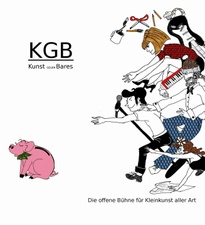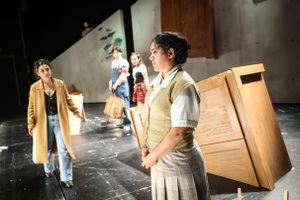Draußen vor der Tür
In the organizer's words:
by Wolfgang Borchert - Schauspielhaus, Großes Haus - Drama
"'People always think that war only eats people where it happens, but it eats all those who feel it,' wrote the musician Ofer Waldman. What is being eaten up is precisely what is needed to keep us together. Let's look at our present from the future and tell ourselves what we did back then to avoid being eaten up." Hadija Haruna-Oelker, journalist
Corporal Beckmann returns from the war. The "pestilent and vigorous animal" has made him tired and weary of life. But it is not only the returnee who has changed, nothing is the same at home either: his child has been killed by a bomb, his marriage is in ruins, his parents, once loyal to the regime, have committed suicide, and the colonel does not want to know about Beckmann's psychological injuries. And he is also unable to come to terms with his experiences on the stage of a cabaret. The traumatized man remains alone with the responsibility for the deaths of his former comrades and with his nightmares. Visions and memories haunt him to the point of suicide. He has lost his faith in the good in people. He can no longer feel at home in the world.
The Nazi opponent Wolfgang Borchert, who died in 1947 at the age of 26, gave expression to his own experiences as a soldier in the Second World War in "Outside the Door". At the same time, the play, written in just a few days as if in a feverish frenzy, deals with universal questions. They concern the psychological constitution of people who have been ravaged by war, their relationships with others and their collapsed trust in the world. What happens to people who experience or perpetrate violence? Under what circumstances are people prepared to break the cycle of violence and counter-violence? What can pragmatic pacifism look like? Director Adrian Figueroa, who recently staged "Biedermann und die Brandstifter" and "Arbeit und Struktur" at the Düsseldorfer Schauspielhaus, will relate these questions to the present day.











